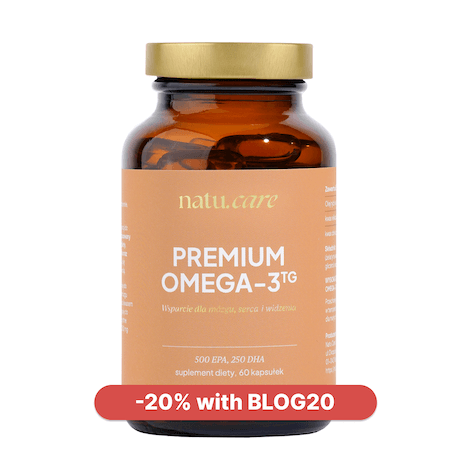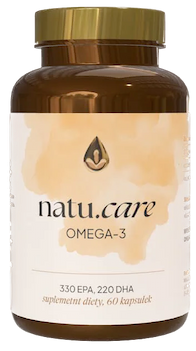- Home
- Omega acids
- Omega-6 fatty acids
Omega-6 fatty acids: deficiency, excess, sources + nutritionist's opinion
Adequate amounts of omega-6 fatty acids are beneficial, but only if you control their supply from the diet.


Learn more about our editorial process
.

Learn more about our editorial process
.

Learn more about our editorial process
.

Learn more about our editorial process
.
Why you can trust us
Articles on Natu.Care are written based on scientific research, data from government websites and other reliable sources. The texts are written in cooperation with doctors, nutritionists and other health and beauty experts. Articles are reviewed before publication and during significant updates.
.Learn more about our editorial process
.Information about advertisements
Content on Natu.Care may contain links to products from the sale of which we may receive a commission. When creating content, we adhere to high editorial standards and take care to be objective about the products discussed. The presence of affiliate links is not dictated by our partners, and we select the products we review ourselves completely independently.
.Learn more about our terms and Conditions
.Omega-6 acids can either be your good buddy or stab you in the back. If you're looking after a nutritious and varied diet, it's likely your omega-6 acids are committed to you and looking after your health.
If, however, your diet is far from ideal - homogenised cheese is 'dairy' and chips are 'vegetables'. - then I have bad news for you. The omega-6 fatty acids have started the party at your expense.
It's time to get to know these characterful acids better and learn to manage them. Take them at your peril and they won't break your heart, they'll make it stronger.
Take a risk.
From this article you will learn:
- What omega-6 acids are. .
- How harmful an excess of omega-6 fatty acids is. .
- What is a healthy ratio of omega-3 to omega-6 fatty acids in the diet.
- What is a healthy ratio of omega-3 to omega-6 fatty acids in the diet?
- How to tame omega-6 fatty acids so they support you, not harm you. .
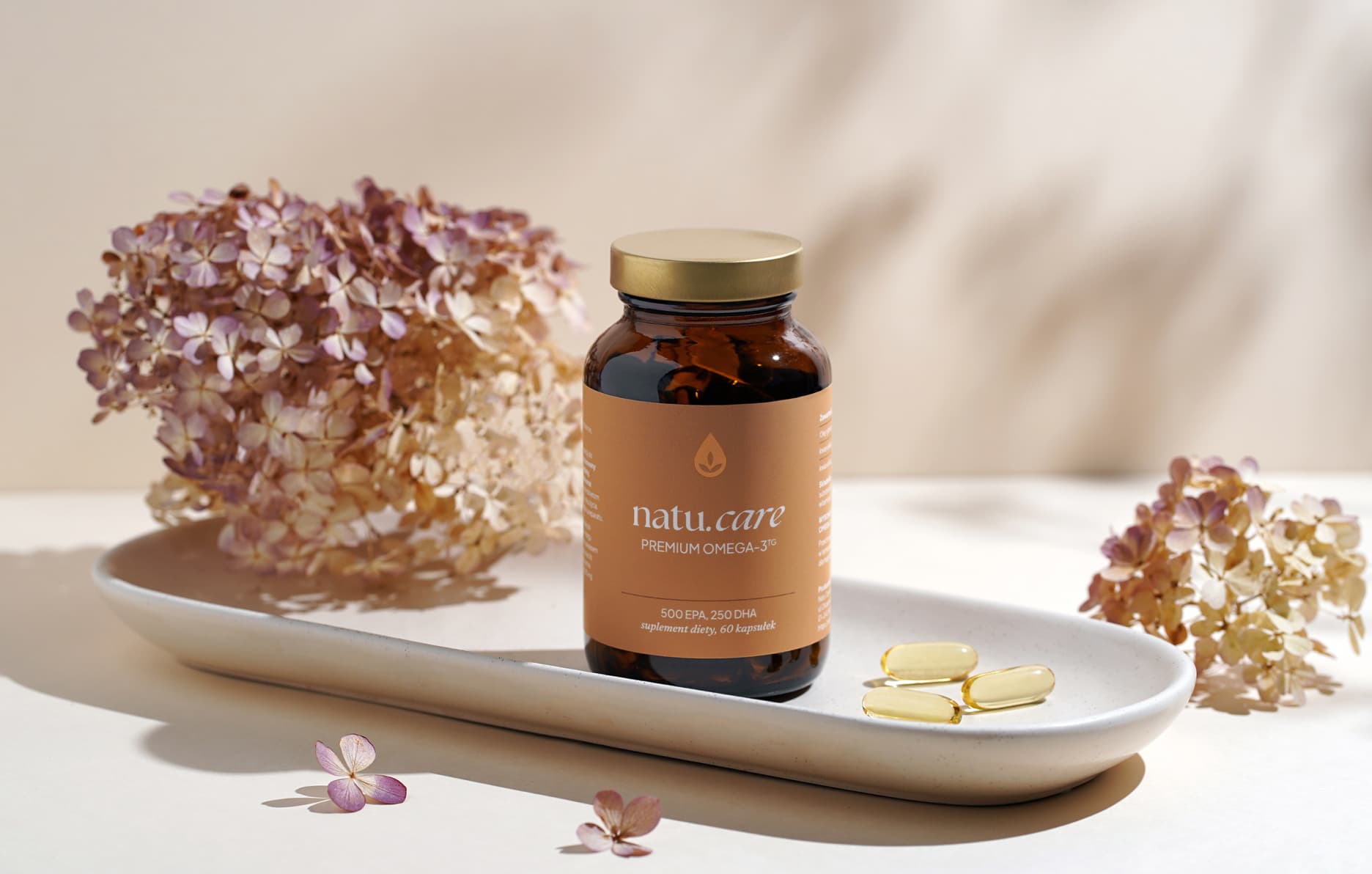
Sprawdź, za co pokochały go tysiące klientek Natu.Care Premium Omega-3ᵀᴳ -15% z kodem BLOG15
Natu.Care Omega-3ᵀᴳ Premium
Natu.Care Omega-3ᵀᴳ Premium dla zdrowia serca, mózgu i odporności. Najlepsza przyswajalność. Optymalna dawka 750 mg. Przebadana przez niezależne laboratorium.
Zobacz więcej
Produkt ma super skład, transparentną etykietę i co dla mnie jest ważne – małe kapsułki do połknięcia. Nie ma też nieprzyjemnego efektu odbijania rybą, który miałam spożywając inne produkty. Widzę znaczną poprawę odporności. Polecam!@Kasia P.
See also:
.- Omega acids
- Omega-3 fatty acids
- Omega-9 fatty acids
- Omega 3-6-9 acids .
- EPA acid
- DHA acid .
- ALA acid
- Omega-3 fatty acid deficiency
Omega acids - essential fats
.Omega acids belong to the group of unsaturated fatty acids - the so-called healthy fats. They are essential for the functioning of the nervous, cardiovascular and immune systemsand. Thanks to omega acids, the body produces energy, builds cell membranes, produces hormones and neurotransmitters. They also affect your appearance and moodand.
The most important essential fatty acids for our bodies are polyunsaturated fatty acids (PUFAs), which include omega-6 fatty acids. The body cannot make them, so you need to supply them with diet.
.The thing with these acids is that when you 'watch' for them in your diet, they bring many benefits to the bodyand. However, when let off the dietary leash, they can cause problems, as you'll read about in a moment.
Properties of omega-6 fatty acids
.The correct amount of omega-6 fatty acids takes care ofand:
- brain and nervous system, .
- heart and circulatory system, .
- control of inflammation, .
- metabolism, .
- skin and hair condition. .
They will take care of you and protect you from disease, but only if you maintain a healthy balance of them in your body.
How does this care look in practice?
.Provide support for the cardiovascular system
.Adequate amounts of omega-6 fatty acids help regulate the levels of 'bad' LDL cholesterol in the bodyand. It reduces its production and increases its removal from the body. This is important because high LDL levels are associated with an increased risk of cardiovascular disease .
Scientific research suggests that correct amounts of omega-6 fatty acids protect against coronary heart disease..
 .
.
Witold Tomaszewskidoctor of medical sciences
.Promote brain and nervous system function
.Omega-6 are essential for brain development and central nervous system function from prenatal lifeand. They regulate the composition of the neuronal cell membrane and allow it to maintain adequate fluidity. Thus, they improve the transmission of signals between nerve cells.
The proper functioning of neurotransmitters is an important process for the control of bodily functions, e.g. regulation of breathing, learning, pain relief, rapid response to stressful situations..
 .
.
Witold Tomaszewskidoctor of medical sciences
.Regulate carbohydrate metabolism
.Omega-6 fatty acids regulate blood sugar levels, control glucose absorption into the bloodstream and protect the body from chronic diseasesand.
Proper carbohydrate metabolism is crucial for health and well-being. A large rise in blood sugar and then a sharp fall in blood sugar not only causes lethargy, fatigue, but contributes to fat accumulation, increased risk of insulin resistance and type 2 diabetes..
 .
.
Alexandra Cudna Clinical nutritionist
Regulate inflammation
.Proper concentrations of omega-6 fatty acids can have anti-inflammatory effectsand. These acids are converted into epoxyicosatrienoic acids (and now let's read that out loud!), which have been shown in scientific studies to have anti-inflammatory and analgesic effectsand.
Care for hair and skin health
.Omega-6 fatty acids, specifically linoleic acid (LA) is an essential component of ceramides, which are involved in maintaining the epidermal water-lipid barrier. It prevents water loss and protects the skin from harmful external factorsand.
Acid LA has anti-inflammatory properties, which can help reduce the risk of skin inflammation and related conditions such as acne and eczema .
And how about treating skin with omega-6 from the outside in?
.Omega-6 acids are used in cosmetics. Topical application of oils with these acids improves hydration and skin barrier function..
 .
.
Katarzyna SrebrCosmetologist
In a scientific study, supplementation with gamma-linolenic acid (GLA) improved skin barrier function and reduced skin roughness in patients with atopic dermatitisand.
What's too much is not healthy
.As you can see, an optimal amount of omega-6 fatty acids in your body brings you many benefits. When kept in check, the acids support health, wellbeing and appearance. Unfortunately, the 'Western diet' provides too many omega-6 acids in foods. They are virtually everywhere. And this is where the problem begins.
According to scientistsand a healthy ratio of fatty acids omega-3 to omega-6 should be between 1:1 and 1:4. Research suggestsand that people following the so-called "Western diet" may consume acids in a ratio... of 1:15 to almost 1:17.
Western diet is the term for a diet dominated by processed foods, convenience foods, sugar, salt, red meat, white flour and harmful food additives. Such a diet lacks vitamins, minerals, healthy fats and fibre..
 .
.
Alexandra Cudna Clinical nutritionist
What are the effects of excess omega-6 fatty acids in the diet?
.- Permanent inflammation. This condition promotes the development of chronic diseases, including cardiovascular, inflammatory and autoimmune diseasesand.
- Increased risk of cancer. Scientific studies have shown that excess omega-6 promotes breast cancer .
- Exacerbation of arthritis symptoms. Excess omega-6 can trigger the body's production of pro-inflammatory substances, potentially worsening symptoms in people with arthritis .
- Risk of obesity. Excess acids often come with high-calorie, processed foods that promote weight gain .
- Deterioration of skin condition. Too much omega-6 fatty acids in the diet can result in increased acne lesions and poor skin condition . .
- Promotes depression. Research suggests that an abnormal ratio of omega acids, with a predominance of omega-6 increases the chances of depressionand. .
Well, and importantly, an excess results in your true friends, omega-3 acids, not being able to come to the fore.
What are your favourite sources of omega-6 fatty acids - Snickers, Lays or shortbread cookies? Why does what's tastiest have to be so unhealthy? Researchers suggestand, high-sugar and high-fat foods not only taste better, but may be linked to the release of certain chemicals in the brain (such as serotonin) that give us feelings of pleasure.
Product description
The dietary supplement contains omega-3ᵀᴳ, or omega-3 acids in the form of trójglyceridesów. Scientific studies suggest that this form of fatty acidsós up to 2 times better absorbed than the estersós present in many dietary supplements on the market. This means that you are assured of their effectiveness and of supplying yourself with valuable omega acids.
Fatty acids omega-3 are derived from wild anchovy oil. It is a rich source of healthy fats that are essential for the health of the cardiovascular, immune and nervous systems, as well as the proper function of vision, joints muscles.
Scientific research suggests that wild anchovies are a good source of healthy fats.
Scientific research also suggests that an adequate intake of omega-3 fatty acidsós protects against and supports the treatment of depression and anxiety disorders. In addition, omega-3s influence the hydration and appearance of the skinóry and support healthy sleep.
.
The formula contains a total of 750 mg of EPA+DHA acidsós, which is three times higher than the recommended minimum of 250 mg for the Polish population. Omega-3 TG Premium has studies indicating that its TOTOX is 9, which is a very good result.
Supplementation of omega-3 fatty acidsóis recommended for anyone who does not eat 1–2 portions (approximately 300 g) of oily fish per week. Children during growth, seniors, physically active people, vegans and vegetarians, as well as patients undergoing cardiovascular treatment and prevention of heart disease also have an increased need.
Pros and cons
The dietary supplement contains omega-3ᵀᴳ, or omega-3 acids in the form of trójglyceridesów. Scientific studies suggest that this form of fatty acidsós up to 2 times better absorbed than the estersós present in many dietary supplements on the market. This means that you are assured of their effectiveness and of supplying yourself with valuable omega acids.
Fatty acids omega-3 are derived from wild anchovy oil. It is a rich source of healthy fats that are essential for the health of the cardiovascular, immune and nervous systems, as well as the proper function of vision, joints muscles.
Scientific research suggests that wild anchovies are a good source of healthy fats.
Scientific research also suggests that an adequate intake of omega-3 fatty acidsós protects against and supports the treatment of depression and anxiety disorders. In addition, omega-3s influence the hydration and appearance of the skinóry and support healthy sleep.
.
The formula contains a total of 750 mg of EPA+DHA acidsós, which is three times higher than the recommended minimum of 250 mg for the Polish population. Omega-3 TG Premium has studies indicating that its TOTOX is 9, which is a very good result.
Supplementation of omega-3 fatty acidsóis recommended for anyone who does not eat 1–2 portions (approximately 300 g) of oily fish per week. Children during growth, seniors, physically active people, vegans and vegetarians, as well as patients undergoing cardiovascular treatment and prevention of heart disease also have an increased need.
Additional information
The dietary supplement contains omega-3ᵀᴳ, or omega-3 acids in the form of trójglyceridesów. Scientific studies suggest that this form of fatty acidsós up to 2 times better absorbed than the estersós present in many dietary supplements on the market. This means that you are assured of their effectiveness and of supplying yourself with valuable omega acids.
Fatty acids omega-3 are derived from wild anchovy oil. It is a rich source of healthy fats that are essential for the health of the cardiovascular, immune and nervous systems, as well as the proper function of vision, joints muscles.
Scientific research suggests that wild anchovies are a good source of healthy fats.
Scientific research also suggests that an adequate intake of omega-3 fatty acidsós protects against and supports the treatment of depression and anxiety disorders. In addition, omega-3s influence the hydration and appearance of the skinóry and support healthy sleep.
.
The formula contains a total of 750 mg of EPA+DHA acidsós, which is three times higher than the recommended minimum of 250 mg for the Polish population. Omega-3 TG Premium has studies indicating that its TOTOX is 9, which is a very good result.
Supplementation of omega-3 fatty acidsóis recommended for anyone who does not eat 1–2 portions (approximately 300 g) of oily fish per week. Children during growth, seniors, physically active people, vegans and vegetarians, as well as patients undergoing cardiovascular treatment and prevention of heart disease also have an increased need.
Expert opinion
The dietary supplement contains omega-3ᵀᴳ, or omega-3 acids in the form of trójglyceridesów. Scientific studies suggest that this form of fatty acidsós up to 2 times better absorbed than the estersós present in many dietary supplements on the market. This means that you are assured of their effectiveness and of supplying yourself with valuable omega acids.
Fatty acids omega-3 are derived from wild anchovy oil. It is a rich source of healthy fats that are essential for the health of the cardiovascular, immune and nervous systems, as well as the proper function of vision, joints muscles.
Scientific research suggests that wild anchovies are a good source of healthy fats.
Scientific research also suggests that an adequate intake of omega-3 fatty acidsós protects against and supports the treatment of depression and anxiety disorders. In addition, omega-3s influence the hydration and appearance of the skinóry and support healthy sleep.
.
The formula contains a total of 750 mg of EPA+DHA acidsós, which is three times higher than the recommended minimum of 250 mg for the Polish population. Omega-3 TG Premium has studies indicating that its TOTOX is 9, which is a very good result.
Supplementation of omega-3 fatty acidsóis recommended for anyone who does not eat 1–2 portions (approximately 300 g) of oily fish per week. Children during growth, seniors, physically active people, vegans and vegetarians, as well as patients undergoing cardiovascular treatment and prevention of heart disease also have an increased need.
Product description
The dietary supplement contains high-quality fatty acids omega-3 from anchovy oil. It is a naturally rich source of healthy fats that are essential for cardiovascular, immune and nervous system health, as well as proper function of eyesight, joints muscles.
Scientific research also suggests that an adequate intake of omega-3 fatty acidsós protects against and supports the treatment of depression and anxiety disorders. In addition, omega-3s influence the hydration and appearance of the skinóry and support healthy sleep.
.
The dietary supplement contains 550 mg EPA+DHA per daily serving. This is more than double the official recommendations for the Polish population, whichóre suggesting an intake of at least 250 mg per day.
Supplementation of EPA+DHA is a good way to support healthy sleep.
Supplementation with omega-3 fatty acidsós is advisable if you do not consume 1–2 portions (approx. 300 g) of oily fish per week. There is also an increased need for physically active people, vegans and vegetarians, seniors, children during growth spurts and patients undergoing cardiovascular treatment and prevention of heart disease.
Pros and cons
The dietary supplement contains high-quality fatty acids omega-3 from anchovy oil. It is a naturally rich source of healthy fats that are essential for cardiovascular, immune and nervous system health, as well as proper function of eyesight, joints muscles.
Scientific research also suggests that an adequate intake of omega-3 fatty acidsós protects against and supports the treatment of depression and anxiety disorders. In addition, omega-3s influence the hydration and appearance of the skinóry and support healthy sleep.
.
The dietary supplement contains 550 mg EPA+DHA per daily serving. This is more than double the official recommendations for the Polish population, whichóre suggesting an intake of at least 250 mg per day.
Supplementation of EPA+DHA is a good way to support healthy sleep.
Supplementation with omega-3 fatty acidsós is advisable if you do not consume 1–2 portions (approx. 300 g) of oily fish per week. There is also an increased need for physically active people, vegans and vegetarians, seniors, children during growth spurts and patients undergoing cardiovascular treatment and prevention of heart disease.
Additional information
The dietary supplement contains high-quality fatty acids omega-3 from anchovy oil. It is a naturally rich source of healthy fats that are essential for cardiovascular, immune and nervous system health, as well as proper function of eyesight, joints muscles.
Scientific research also suggests that an adequate intake of omega-3 fatty acidsós protects against and supports the treatment of depression and anxiety disorders. In addition, omega-3s influence the hydration and appearance of the skinóry and support healthy sleep.
.
The dietary supplement contains 550 mg EPA+DHA per daily serving. This is more than double the official recommendations for the Polish population, whichóre suggesting an intake of at least 250 mg per day.
Supplementation of EPA+DHA is a good way to support healthy sleep.
Supplementation with omega-3 fatty acidsós is advisable if you do not consume 1–2 portions (approx. 300 g) of oily fish per week. There is also an increased need for physically active people, vegans and vegetarians, seniors, children during growth spurts and patients undergoing cardiovascular treatment and prevention of heart disease.
Expert opinion
The dietary supplement contains high-quality fatty acids omega-3 from anchovy oil. It is a naturally rich source of healthy fats that are essential for cardiovascular, immune and nervous system health, as well as proper function of eyesight, joints muscles.
Scientific research also suggests that an adequate intake of omega-3 fatty acidsós protects against and supports the treatment of depression and anxiety disorders. In addition, omega-3s influence the hydration and appearance of the skinóry and support healthy sleep.
.
The dietary supplement contains 550 mg EPA+DHA per daily serving. This is more than double the official recommendations for the Polish population, whichóre suggesting an intake of at least 250 mg per day.
Supplementation of EPA+DHA is a good way to support healthy sleep.
Supplementation with omega-3 fatty acidsós is advisable if you do not consume 1–2 portions (approx. 300 g) of oily fish per week. There is also an increased need for physically active people, vegans and vegetarians, seniors, children during growth spurts and patients undergoing cardiovascular treatment and prevention of heart disease.
ALLNUTRITION Omega 3 Strong
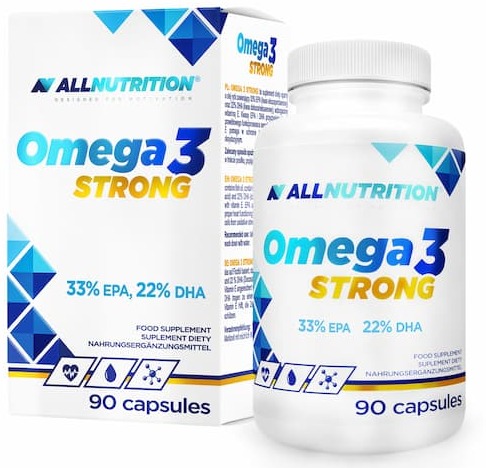
- Content omega-3 acids: 550 mg (DHA 220 mg + EPA 330 mg)
- Additional active ingredients: vitamin E
- Form: capsules .
- Dose: 1 capsule per day .
- Sufficient for: 90 days .
Product description
A dietary supplement with a solid portion of DHA and EPA – valuable for health and well-being omega-3 acidsós. Indicated especially for people on a plant-based diet, physically active people and seniors.
.The sourceóof omega-3 acids in this preparation is fish oil.
.Pros and cons
A dietary supplement with a solid portion of DHA and EPA – valuable for health and well-being omega-3 acidsós. Indicated especially for people on a plant-based diet, physically active people and seniors.
.The sourceóof omega-3 acids in this preparation is fish oil.
.Additional information
A dietary supplement with a solid portion of DHA and EPA – valuable for health and well-being omega-3 acidsós. Indicated especially for people on a plant-based diet, physically active people and seniors.
.The sourceóof omega-3 acids in this preparation is fish oil.
.User review
A dietary supplement with a solid portion of DHA and EPA – valuable for health and well-being omega-3 acidsós. Indicated especially for people on a plant-based diet, physically active people and seniors.
.The sourceóof omega-3 acids in this preparation is fish oil.
.Solgar Omega 3-6-9
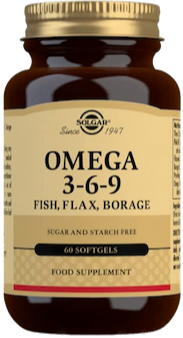
- Content of omega acids:.
- Omega-3 fatty acids.
- Omega-3 fatty acids
- alpha-linolenic acid (ALA) – 585 mg
.- eicosapentaenoic acid (EPA) – 344 mg
- docosahexaenoic acid (DHA) – 221 mg
.
- Omega-3 fatty acids
- Omega-6 fatty acids.
- linoleic acid (LA) – 598 mg .
- gamma-linolenic acid (GLA) – 274 mg .
- Omega-9 fatty acids.
- Oleic acid – 325 mg .
- Omega-3 fatty acids.
- Source of omega acids: fish oil from anchovies, mackerel, sardines, linseed oil, cucumber oil .
- Form: capsules .
- Packaging: 60 capsules .
- Daily allowance:3 capsules per day .
- Sufficient for: 20 days .
Product description
A combination of omega 3-6-9 fatty acidsós derived from fish and plants. The dietary supplement supplements essential omega fatty acids, whichóre needed for the proper functioning of many systemsóorgansóin the body.
Pros and cons
A combination of omega 3-6-9 fatty acidsós derived from fish and plants. The dietary supplement supplements essential omega fatty acids, whichóre needed for the proper functioning of many systemsóorgansóin the body.
Additional information
A combination of omega 3-6-9 fatty acidsós derived from fish and plants. The dietary supplement supplements essential omega fatty acids, whichóre needed for the proper functioning of many systemsóorgansóin the body.
A combination of omega 3-6-9 fatty acidsós derived from fish and plants. The dietary supplement supplements essential omega fatty acids, whichóre needed for the proper functioning of many systemsóorgansóin the body.
Omega + Vitamin D3 800 IU for children
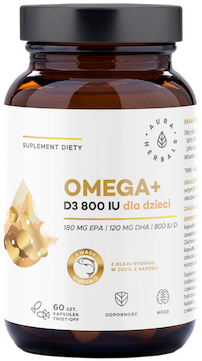
- Content of omega-3 fatty acids: 300 mg (180 mg EPA + 120 mg DHA)
- .
- Additional active ingredients: vitamin D3
- Form: twist-off capsules
- .
- Dose: 1 capsule per day
- .
- Sufficient for: 60 days
- .
Product description
Omega-3 acids for children with added vitamin D3 in good doses. The formula fills the daily requirement of EPA and DHA and vitamin D for children aged 2–18 years.
The Ministry of Health recommends supplementation with vitamin D3. In turn, omega-3 fatty acids are also crucial for the youngest.
The dietary supplement from Aura Herbals supports mós brain function, proper vision and immune system function.
The omega-3 fatty acids are derived from fish oil sourced from anchovies.
Pros and cons
Omega-3 acids for children with added vitamin D3 in good doses. The formula fills the daily requirement of EPA and DHA and vitamin D for children aged 2–18 years.
The Ministry of Health recommends supplementation with vitamin D3. In turn, omega-3 fatty acids are also crucial for the youngest.
The dietary supplement from Aura Herbals supports mós brain function, proper vision and immune system function.
The omega-3 fatty acids are derived from fish oil sourced from anchovies.
Additional information
Omega-3 acids for children with added vitamin D3 in good doses. The formula fills the daily requirement of EPA and DHA and vitamin D for children aged 2–18 years.
The Ministry of Health recommends supplementation with vitamin D3. In turn, omega-3 fatty acids are also crucial for the youngest.
The dietary supplement from Aura Herbals supports mós brain function, proper vision and immune system function.
The omega-3 fatty acids are derived from fish oil sourced from anchovies.
User review
Omega-3 acids for children with added vitamin D3 in good doses. The formula fills the daily requirement of EPA and DHA and vitamin D for children aged 2–18 years.
The Ministry of Health recommends supplementation with vitamin D3. In turn, omega-3 fatty acids are also crucial for the youngest.
The dietary supplement from Aura Herbals supports mós brain function, proper vision and immune system function.
The omega-3 fatty acids are derived from fish oil sourced from anchovies.
{ product:1ZN0pnin20IQ025sIqOBUF }}
Types of omega-6 fatty acids
.Learn about the corrosive omega-6 acids::
.- linoleic acid (LA), .
- gamma-linolenic acid (GLA), .
- arachidonic acid (AA), .
What is worth knowing about each of these?"
.Linoleic acid (LA)
.You can find it in oils (e.g. safflower, evening primrose, soybean), nuts, seeds and processed foods.
Many processed foods contain high levels of linoleic acid. This is due to, among other things, the addition of cheap vegetable oils (including sunflower, soybean), which are often subjected to very high temperatures. Read labels carefully and be aware of what you are eating..
 .
.
Alexandra Cudna Clinical nutritionist
This acid is best known and appreciated by researchers, mainly for its positive effects on the cardiovascular system. However, remember to always rely on natural sources of this acid - processed ones will do you more harm than good.
How does linoleic acid support the body?
.- Promotes the lowering of triglycerides and "bad" LDL cholesterol, raising blood levels of "good" HDL cholesteroland. .
- Participates in the production of hormones and cell membranes .
- Helps regulate metabolism . .
- Promotes immune system function . .
- Maintains the skin's natural protective barrier . .
- Has anti-inflammatory properties and may reduce the risk of chronic diseases . .
- Is a precursor to arachidonic acid, which plays an important role in the body's immune response .
The authors of one scientific study found that taking dietary supplements of one form of LA - conjugated linoleic acid (CLA) - may help to reduce body fat and. We look forward to further work and conclusions.
Arachidonic acid (AA)
.AA mediates the function of many organs and systems directly or after conversion to eicosanoids. These are important compounds that the body can use to regulate various inflammatory, physiological and even pathological processesand. Sources of AA include vegetable oils, red meat, eggs and unhealthy, processed foods.
How does arachidonic acid support the body?
.- It is accumulated in the brain and retina during fetal development and plays an important role in the development of infantsand. .
- Promotes nervous system health as it is an important structural component of the nervous system .
- Promotes the growth and regeneration of the body's cells . .
Preliminary research suggests that ARA may contribute to increases in lean body mass and strength when combined with resistance training . I look forward to further research and will let you know what it shows.
Arachidonic acid is a precursor of potent pro-inflammatory compounds such as prostaglandins. The discovery of the biochemical pathway of this acid has allowed scientists to develop anti-inflammatory drugs such as ibuprofen and naproxen. These inhibit the production of prostaglandins. As a result, we feel much better just a few hours after taking a tablet..
 .
.
Alexandra Cudna Clinical nutritionist
Gamma-linolenic acid (GLA)
.GLA can be found in some vegetable oils, such as borage, evening primrose and hemp seed, as well as in human milkand. A number of scientific papers demonstrate the health-promoting properties of this acid, but these are mainly animal studiesand.
We do, however, know what functions it has in the human body.
.How does GLA acid work?
.- Play a role in regulating the body's inflammatory and immune processesand. .
- Can be converted into eicosanoids, which have anti-inflammatory and analgesic effects .
- Participates in the transport and oxidation of cholesterol . .
- Is one of the components of the lipid membrane, which protects the inside of cells from harmful factors from the environment .
Omega-6 acids - the boys to beat?
.While omega-3 acids are popular and advertised by shiny pink salmon and handsome Norway, omega-6 acids are treated with aloofness. You too, after reading so far, probably feel that all they do is smother omega-3s and sow confusion in the body.
Yes, but it's not their fault, it's your diet. Auć, I know. It might have hurt.
It's not.
Omega-6 fatty acids can support your health and wellbeing. Thank them for nice skin, too. But it's your dietary decisions that will determine how these acids will work - supportively or damagingly. That's why you will start paying attention to the harmony of omega acids in your diet from today.
Ratio of omega-3 to omega-6
.A healthy ratio of fatty acids omega-3 to omega-6 should be between 1:1 and 1:4and.
It is important not to focus on avoiding these 'bad omega-6 fatty acids', but on providing more omega-3 fatty acids. You can't control your supply of omega-6 fatty acids all the time. And you're human too - sometimes crisps are best for dinner, and a bar goes well with coffee. There's room for everything in the diet.
How to eat omega acids and not go crazy?
.Firstly, make sure you're getting your omega-3 acids. The recommendations are to consume 250 mg of EPA + DHA acids per day. In practice, this means that you should eat 1-2 portions of oily fish per week.
Mackerel, sardines, salmon, herring, salmon trout - surely any fish with the right sauce and accompaniments will caress your palate and nourish your body. If you don't eat fish, rely on good food supplements with omega-3 fatty acids.
Beware of 'omega 3-6-9' supplements - you can read about why in the article:
.Rape seed oil is a Polish superfood - it contains a perfectly balanced ratio of omega acids, vitamins and antioxidant compounds..
 .
.
Alexandra Cudna Clinical nutritionist
Where does omega-6 occur?
.Omega-6 acids from healthy sources, are nutritious and tasty. Do you have them in your diet?
. .|
Product . |
Content of omega-6 fatty acids in 100 g* |
|
| . |
Safflower oil |
74,500 mg . |
|
Soybean oil . |
50 960 mg |
|
|
Pumpkin seed oil |
50,000 mg |
|
|
Corn oil |
49,300 mg |
|
|
Sunflower oil |
39 230 mg |
|
|
Almonds |
12,070 mg |
|
|
Chews |
7840 mg |
|
|
Hazelnuts |
7290 mg |
|
|
Walnuts |
7790 mg |
|
|
Pumpkin seeds |
6740 mg |
|
|
Avocado |
3940 mg |
*The content of omega-6 fatty acids can vary depending on a number of factors, such as cultivation and heat treatment.
Omega-6 fatty acids are also found in many unhealthy, processed vegetable oil-based products. You are likely to be getting a lot of omega-6 fatty acids from salty snacks, biscuits, bars and ready meals - bear this in mind.
Warming up the image of Snickers
.Point of view depends on where you sit. Snickers is a processed product, but compared to fish oil (rich in omega-3 fatty acids), the bar has more protein and carbohydrates, and less saturated fat and cholesterol per 100g. Have room in your diet for both. Well, okay, for the fish oil a little more.
Omega-6 deficiency
.OK, this is a rarity. Omega-6 fatty acids have made themselves comfortable in your body and are not complaining about company. However, if your diet is nutritionally poor and lacks variety, your body will signal to you that it needs healthy fats.
Symptoms of omega-6 fatty acid deficiency and:
- dry and flaky skin, .
- impaired wound healing, .
- increased susceptibility to skin infections, .
- impaired concentration and sustained attention, .
- mood disturbances, depression and irritability, .
- disorders of hormone metabolismj, .
- disruption of inflammatory processes in the body, .
- deterioration of joint condition and increased risk of rheumatic diseases. .
Overabundance of omega-6
.Many health complaints can result from a poor diet rich in processed foods and unhealthy snacks. The body will quickly manifest an excess of omega-6 fatty acids.
The body will quickly manifest an excess of omega-6 fatty acids.
Symptoms of excess omega-6 fatty acids and:
- skin lesions, e.g. pustoriasis, acne, .
- arthritis and joint pain, .
- immune disorders, .
- hormonal disorders, .
According to the CSO, in 2022 the average Pole consumed just 200 grams of fish per month. This result is alarming, as this is the amount we should be consuming on a weekly basis.
 .
.
Alexandra Cudna Clinical nutritionist
Do you already know how to structure your daily menu and tame omega-6 acids? They're beneficial and important fatty acids for your health, but you can't hug them too tightly - instead of a nice cuddle, they'll choke you up.
See also:
- Guide: which omega-3 acids to choose? .
- Omega-3 for athletes
- Best sources of omega-3 in the diet
- Triglycerides - why are they better than ethyl esters?
- Omega drug, not a supplement. Doctor's opinion
- Omega-3 in tablets - ranking
- Best healthy breakfast recipes
- EPA + DHA, what do they give?
Summary
.In summary
- Omega-6 fatty acids belong to the group of essential fatty acids.
- There are three main omega-6 fatty acids.
- There are three most important omega-6 fatty acids: arachidonic (ALA), linoleic (LA), gamma-linolenic (GLA).
- There are three essential fatty acids.
- The ratio of omega-3 to omega-6 acids should be between 1:1 and 1:4. .
- Overabundance of omega-6 fatty acids can lead to the development of a number of diseases, inflammation, depression, skin deterioration and breast cancer.
- Optimal amounts of omega-6 fatty acids support cardiovascular and nervous system function, support carbohydrate metabolism, reduce inflammation and keep the skin in good condition.
- Take care.
- Care for omega-3 fatty acid supplementation and limit processed foods. .
FAQ
.Is omega-6 fatty acid healthy?
.Yes, omega-6 acid is healthy if we supply it to the body in moderate amounts. Its adequate concentration in the body has a positive effect on the function of many systems, such as the cardiovascular and nervous systems. An excess of omega-6 acid can lead to inflammation and increase the risk of heart disease, so it is important to maintain a balance between omega-3 and omega-6 acids.
What is better omega-3 or 6?
.Both fatty acids and their proper balance in the body are important for the operation of many systems in the body and metabolism. However, omega-3 and omega-6 fatty acids compete with each other for space in the body, and an excess of omega-6 reduces the use of omega-3. Ensure an adequate supply and balance of these fatty acids to enjoy health.
How many omega-6 fatty acids a day?"
.According to Polish dietary standards, the recommended daily amount of omega-6 refers to the representative of these acids - linoleic acid. It amounts to 4% of the energy value of diet, which, for a 2000 kcal diet, gives about 9 grams of linoleic acid per day. It should be borne in mind that, especially in the Western diet, far too much omega-6 fatty acids are consumed, which adversely affects the body and the absorption of omega-3 fatty acids.
Can omega-3 and 6 fatty acids be combined?
.It is not advisable to combine supplements with omega-3 and omega-6 acids. Taking these supplements at the same time has no health benefits, and disrupts the balance between these acids. The omega-6 acid, which we usually consume too much of from our diet, negatively affects the absorption of omega-3. It is best to supplement omega-3 acids if you do not consume oily fish, and obtain omega-6 acids from healthy plant sources.
What are the most omega-6 fatty acids in?
.Most omega-6 fatty acids are contained in high quality vegetable oils e.g. safflower, soybean, pumpkin seed, nuts e.g. almonds, cashews, hazelnuts. Be aware that omega-6 fatty acids are also found in many unhealthy, processed foods such as crisps and bars.
Is it worth supplementing with omega-6 fatty acids?
.No, it is not worth supplementing omega-6 fatty acids as they are easily provided from diet. These acids are best obtained from natural, healthy plant fats e.g. oils, nuts, seeds. In the Western diet we get a great deal of omega-6 fatty acids from processed food. Excess negatively affects the absorption of omega-3 acids and it is these acids that you should supplement, especially if you do not eat oily fish.
What is the ideal ratio of omega-3 to omega-6 fatty acids?
.Sources
.See all
.Abdelhamid, A., Hooper, L., Sivakaran, R., Hayhoe, R. P. G., & Welch, A. A. (2019). The Relationship Between Omega-3, Omega-6 and Total Polyunsaturated Fat and Musculoskeletal Health and Functional Status in Adults: A Systematic Review and Meta-analysis of RCTs. Calcified Tissue International, 105(4). https://doi.org/10.1007/s00223-019-00584-3
An Increase in the Omega-6/Omega-3 Fatty Acid Ratio Increases the Risk for Obesity-PMC. (n.d.). Retrieved April 18, 2023, from https://www.ncbi.nlm.nih.gov/pmc/articles/PMC4808858/
Balić, A., Vlašić, D., Žužul, K., Marinović, B., & Bukvić Mokos, Z. (2020). Omega-3 Versus Omega-6 Polyunsaturated Fatty Acids in the Prevention and Treatment of Inflammatory Skin Diseases. International Journal of Molecular Sciences, 21(3), Article 3. https://doi.org/10.3390/ijms21030741
Bartsch, H., Nair, J., & Owen, R. W. (1999). Dietary polyunsaturated fatty acids and cancers of the breast and colorectum: Emerging evidence for their role as risk modifiers. Carcinogenesis, 20(12), 2209-2218. https://doi.org/10.1093/carcin/20.12.2209
Białek, M., & Rutkowska, J. (2015). [The importance of γ-linolenic acid in the prevention and treatment]. Postepy Higieny I Medycyny Doswiadczalnej (Online), 69, 892-904. https://doi.org/10.5604/17322693.1162991
Biomarkers of Dietary Omega-6 Fatty Acids and Incident Cardiovascular Disease and Mortality | Circulation. (n.d.). Retrieved 23 March 2023, from https://www.ahajournals.org/doi/full/10.1161/CIRCULATIONAHA.118.038908
Bozzatello, P., Brignolo, E., De Grandi, E., & Bellino, S. (2016). Supplementation with Omega-3 Fatty Acids in Psychiatric Disorders: A Review of Literature Data. Journal of Clinical Medicine, 5(8), Article 8. https://doi.org/10.3390/jcm5080067
Callaway, J., Schwab, U., Harvima, I., Halonen, P., Mykkänen, O., Hyvönen, P., & Järvinen, T. (2005). Efficacy of dietary hempseed oil in patients with atopic dermatitis. The Journal of Dermatological Treatment, 16(2), 87-94. https://doi.org/10.1080/09546630510035832
de Lorgeril, M., & Salen, P. (2012). New insights into the health effects of dietary saturated and omega-6 and omega-3 polyunsaturated fatty acids. BMC Medicine, 10(1), 50. https://doi.org/10.1186/1741-7015-10-50
Dietary Omega-6/Omega-3 Polyunsaturated Fatty Acid (PUFA) and Omega-3 Are Associated With General and Abdominal Obesity in Adults: UK National Diet and Nutritional Survey-[Scite report]. (n.d.). Retrieved 11 March 2023, from https://scite.ai/reports/dietary-omega-6-omega-3-polyunsaturated-fatty-acid-A3rjvKNe?showReferences=true
Djuricic, I., & Calder, P. C.. (2021). Beneficial Outcomes of Omega-6 and Omega-3 Polyunsaturated Fatty Acids on Human Health: An Update for 2021. Nutrients, 13(7), 2421. https://doi.org/10.3390/nu13072421
Dyall, S. C., & Michael-Titus, A. T. (2008). Neurological Benefits of Omega-3 Fatty Acids. NeuroMolecular Medicine, 10(4), 219-235. https://doi.org/10.1007/s12017-008-8036-z
Fabian, C. J., Kimler, B. F., & Hursting, S. D. (2015). Omega-3 fatty acids for breast cancer prevention and survivorship. Breast Cancer Research, 17(1), 62. https://doi.org/10.1186/s13058-015-0571-6
Grosso, G., Galvano, F., Marventano, S., Malaguarnera, M., Bucolo, C., Drago, F., & Caraci, F. (2014). Omega-3 Fatty Acids and Depression: Scientific Evidence and Biological Mechanisms. Oxidative Medicine and Cellular Longevity, 2014, 313570. https://doi.org/10.1155/2014/313570
GUS. (n.d.). Poland in numbers 2022. stat.gov.pl. Retrieved 19 April 2023, from https://stat.gov.pl/obszary-tematyczne/inne-opracowania/inne-opracowania-zbiorcze/polska-w-liczbach-2022,14,15.html
Hidaka, B. H., Li, S., Harvey, K. E., Carlson, S. E., Sullivan, D. K., Kimler, B. F., Zalles, C. M., & Fabian, C. J. (2015). Omega-3 and Omega-6 Fatty Acids in Blood and Breast Tissue of High-Risk Women and Association with Atypical Cytomorphology. Cancer Prevention Research, 8(5), 359-364. https://doi.org/10.1158/1940-6207.CAPR-14-0351
Innes, J. K., & Calder, P. C. (2018). Omega-6 fatty acids and inflammation. Prostaglandins, Leukotrienes and Essential Fatty Acids, 132, 41-48. https://doi.org/10.1016/j.plefa.2018.03.004
Innis, S. M. (2008). Dietary omega 3 fatty acids and the developing brain. Brain Research, 1237, 35-43. https://doi.org/10.1016/j.brainres.2008.08.078
Institute of Medicine (US) Committee on Nutrition, T., Erdman, J., Oria, M., & Pillsbury, L. (2011). Eicosapentaenoic Acid (EPA) and Docosahexaenoic Acid (DHA). In Nutrition and Traumatic Brain Injury: Improving Acute and Subacute Health Outcomes in Military Personnel. National Academies Press (US). https://www.ncbi.nlm.nih.gov/books/NBK209320/
Johnson, M. (2014). Omega-3, Omega-6 and Omega-9 Fatty Acids: Implications for Cardiovascular and Other Diseases. Journal of Glycomics & Lipidomics, 04(04). https://doi.org/10.4172/2153-0637.1000123
Kiecolt-Glaser, J. K., Belury, M. A., Andridge, R., Malarkey, W. B., & Glaser, R. (2011). Omega-3 supplementation lowers inflammation and anxiety in medical students: A randomized controlled trial. Brain, Behavior, and Immunity, 25(8), 1725-1734. https://doi.org/10.1016/j.bbi.2011.07.229
Le Floc'h, C., Cheniti, A., Connétable, S., Piccardi, N., Vincenzi, C., & Tosti, A. (2015). Effect of a nutritional supplement on hair loss in women. Journal of Cosmetic Dermatology, 14(1), 76-82. https://doi.org/10.1111/jocd.12127
Marklund, M., Wu, J. H. Y., Imamura, F., Del Gobbo, L. C., Fretts, A., de Goede, J., Shi, P., Tintle, N., Wennberg, M., Aslibekyan, S., Chen, T.-A., de Oliveira Otto, M. C., Hirakawa, Y., Eriksen, H. H., Kröger, J., Laguzzi, F., Lankinen, M., Murphy, R. A., Prem, K., ... null, null. (2019). Biomarkers of Dietary Omega-6 Fatty Acids and Incident Cardiovascular Disease and Mortality. Circulation, 139(21), 2422-2436. https://doi.org/10.1161/CIRCULATIONAHA.118.038908
Neukam, K., De Spirt, S., Stahl, W., Bejot, M., Maurette, J.-M., Tronnier, H., & Heinrich, U. (2011). Supplementation of flaxseed oil diminishes skin sensitivity and improves skin barrier function and condition. Skin Pharmacology and Physiology, 24(2), 67-74. https://doi.org/10.1159/000321442
Omega 3 but not omega 6 fatty acids inhibit AP-1 activity and cell transformation in JB6 cells | PNAS. (n.d.). Retrieved April 18, 2023, from https://www.pnas.org/doi/full/10.1073/pnas.131195198
Omega-3 Fatty Acids and Depression: Scientific Evidence and Biological Mechanisms. (n.d.). Retrieved April 18, 2023, from https://www.hindawi.com/journals/omcl/2014/313570/
Passi, S., Cataudella, S., Di Marco, P., De Simone, F., & Rastrelli, L. (2002). Fatty acid composition and antioxidant levels in muscle tissue of different Mediterranean marine species of fish and shellfish. Journal of Agricultural and Food Chemistry, 50(25), 7314-7322. https://doi.org/10.1021/jf020451y
Patterson, E., Wall, R., Fitzgerald, G. F., Ross, R. P., & Stanton, C. (2012). Health Implications of High Dietary Omega-6 Polyunsaturated Fatty Acids. Journal of Nutrition and Metabolism, 2012, 539426. https://doi.org/10.1155/2012/539426
Perera, H., Jeewandara, K. C., Seneviratne, S., & Guruge, C. (2012). Combined ω3 and ω6 supplementation in children with attention-deficit hyperactivity disorder (ADHD) refractory to methylphenidate treatment: A double-blind, placebo-controlled study. Journal of Child Neurology, 27(6), 747-753. https://doi.org/10.1177/0883073811435243
Robinson, D. L., Hermans, A., Seipel, A. T., & Wightman, R. M. (2008). Monitoring Rapid Chemical Communication in the Brain. Chemical Reviews, 108(7), 2554-2584. https://doi.org/10.1021/cr068081q
.Walkiewicz, K., Janion, K., Gętek-Paszek, M., & Nowakowska-Zajdel, E. (2020). The role of linoleic and α-linolenic acids and their metabolites in the maintenance of chronic inflammation and colorectal cancer development. Proceedings of Hygiene and Experimental Medicine, 74, 464-470. https://doi.org/10.5604/01.3001.0014.4864
Ross, B. M. (2007). Omega-3 fatty acid deficiency in major depressive disorder is caused by the interaction between diet and a genetically determined abnormality in phospholipid metabolism. Medical Hypotheses, 68(3), 515-524. https://doi.org/10.1016/j.mehy.2006.07.054
Santos, H. O., Price, J. C., & Bueno, A. A. (2020). Beyond Fish Oil Supplementation: The Effects of Alternative Plant Sources of Omega-3 Polyunsaturated Fatty Acids upon Lipid Indexes and Cardiometabolic Biomarkers-An Overview. Nutrients, 12(10), Article 10. https://doi.org/10.3390/nu12103159
Schuchardt, J. P., Huss, M., Stauss-Grabo, M., & Hahn, A. (2010). Significance of long-chain polyunsaturated fatty acids (PUFAs) for the development and behaviour of children. European Journal of Pediatrics, 169(2), 149-164. https://doi.org/10.1007/s00431-009-1035-8
Sergeant, S., Rahbar, E., & Chilton, F. H. (2016). Gamma-linolenic acid, Dihommo-gamma linolenic, Eicosanoids and Inflammatory Processes. European journal of pharmacology, 785, 77-86. https://doi.org/10.1016/j.ejphar.2016.04.020
Shahidi, F., & Ambigaipalan, P. (2018). Omega-3 Polyunsaturated Fatty Acids and Their Health Benefits. Annual Review of Food Science and Technology, 9(1), 345-381. https://doi.org/10.1146/annurev-food-111317-095850
Simopoulos, A. P. (2002). The importance of the ratio of omega-6/omega-3 essential fatty acids. Biomedicine & Pharmacotherapy, 56(8), 365-379. https://doi.org/10.1016/S0753-3322(02)00253-6
Simopoulos, A. P. (2008). The Importance of the Omega-6/Omega-3 Fatty Acid Ratio in Cardiovascular Disease and Other Chronic Diseases. Experimental Biology and Medicine, 233(6), 674-688. https://doi.org/10.3181/0711-MR-311
Simopoulos, A. P. (2009). Evolutionary Aspects of the Dietary Omega-6:Omega-3 Fatty Acid Ratio: Medical Implications. World Review of Nutrition and Dietetics. https://doi.org/10.1159/000235706
Simopoulos, A. P. (2016). An Increase in the Omega-6/Omega-3 Fatty Acid Ratio Increases the Risk for Obesity. Nutrients, 8(3), 128. https://doi.org/10.3390/nu8030128
Simopoulos, A. P. (2020). Omega-6 and omega-3 fatty acids: Endocannabinoids, genetics and obesity. Ocl, 27. https://doi.org/10.1051/ocl/2019046
.Spite, M. (2013). Deciphering the role of omega-3 polyunsaturated fatty acid-derived lipid mediators in health and disease. The Proceedings of the Nutrition Society, 72(4), 441-450. https://doi.org/10.1017/S0029665113003030
Strickland, A. D. (2014). Prevention of cerebral palsy, autism spectrum disorder, and attention deficit-hyperactivity disorder. Medical Hypotheses, 82(5), 522-528. https://doi.org/10.1016/j.mehy.2014.02.003
Tortosa-Caparrós, E., Navas-Carrillo, D., Marín, F., & Orenes-Piñero, E. (2017). Anti-inflammatory effects of omega 3 and omega 6 polyunsaturated fatty acids in cardiovascular disease and metabolic syndrome. Critical Reviews in Food Science and Nutrition, 57(16), 3421-3429. https://doi.org/10.1080/10408398.2015.1126549
Tsitouras, P. D., Gucciardo, F., Salbe, A. D., Heward, C., & Harman, S. M. (2008). High Omega-3 Fat Intake Improves Insulin Sensitivity and Reduces CRP and IL6, but does not Affect Other Endocrine Axes in Healthy Older Adults. Hormone and Metabolic Research, 40(03), 199-205. https://doi.org/10.1055/s-2008-1046759
Whigham, L. D., Watras, A. C., & Schoeller, D. A. (2007). Efficacy of conjugated linoleic acid for reducing fat mass: A meta-analysis in humans. The American Journal of Clinical Nutrition, 85(5), 1203-1211. https://doi.org/10.1093/ajcn/85.5.1203
Wijendran, V., & Hayes, K. C. (2004). DIETARY n-6 AND n-3 FATTY ACID BALANCE AND CARDIOVASCULAR HEALTH. Annual Review of Nutrition, 24(1), 597-615. https://doi.org/10.1146/annurev.nutr.24.012003.132106
Zietz, B., Hrach, S., Schölmerich, J., & Straub, R. H. (2001). Differential age-related changes of hypothalamus-Pituitary-Adrenal axis hormones in healthy women and men Role of interleukin 6. Experimental and Clinical Endocrinology & Diabetes, 109(02), 93-101. https://doi.org/10.1055/s-2001-14833
Wawryszuk, N. (2023). Omega acids. Everything you need to know (B. Turczynski, Ed.; 1st ed.). Natu.Care. https://books.google.com/books?vid=9788396887818
.Editorials
Meet the team



Omega-3 fatty acids are a useful dietary supplement for active people - improves performance and fitness.
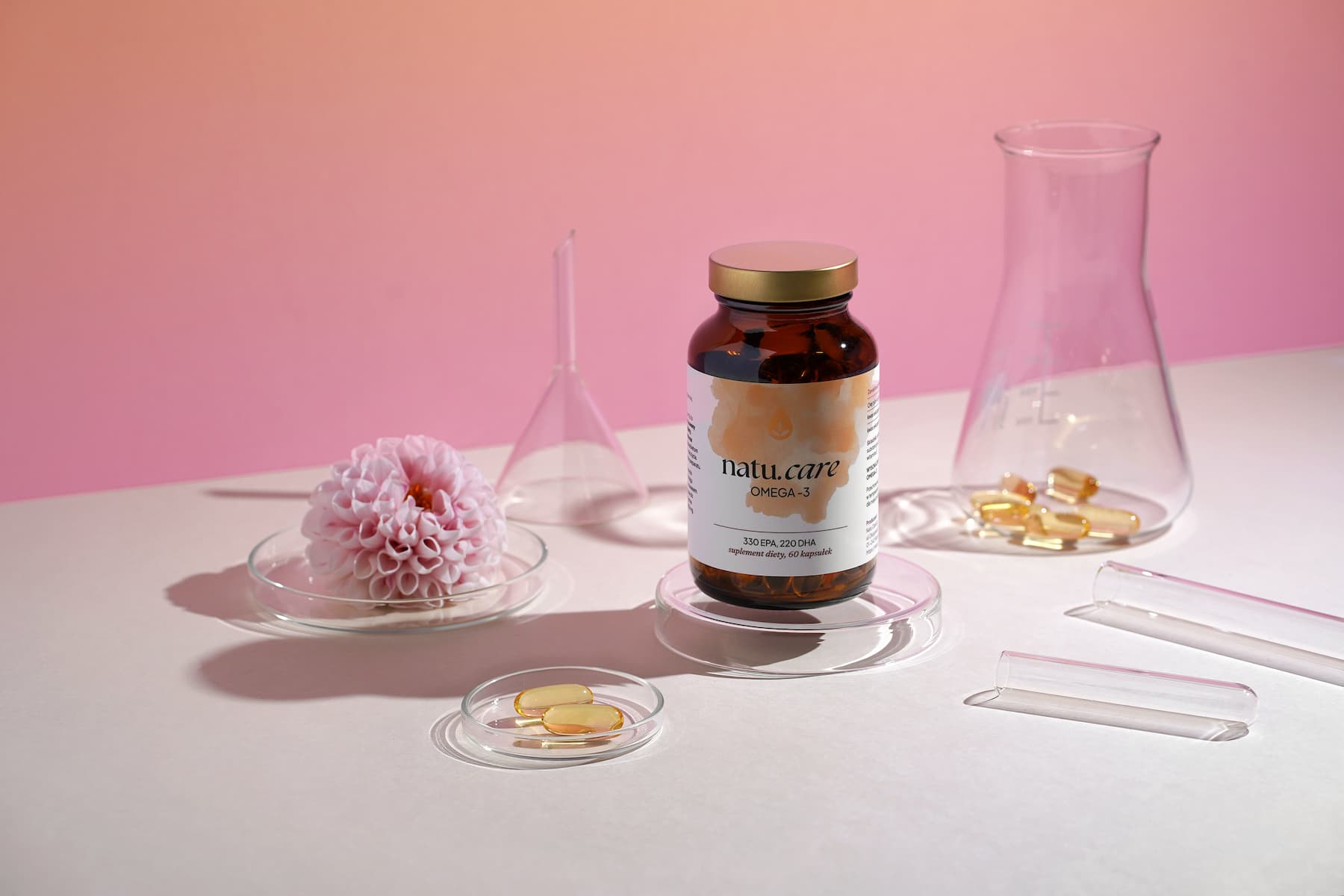
Omega-3 in a good dose and an optimum ratio of DHA and EPA acids will replenish valuable fats in the diet.
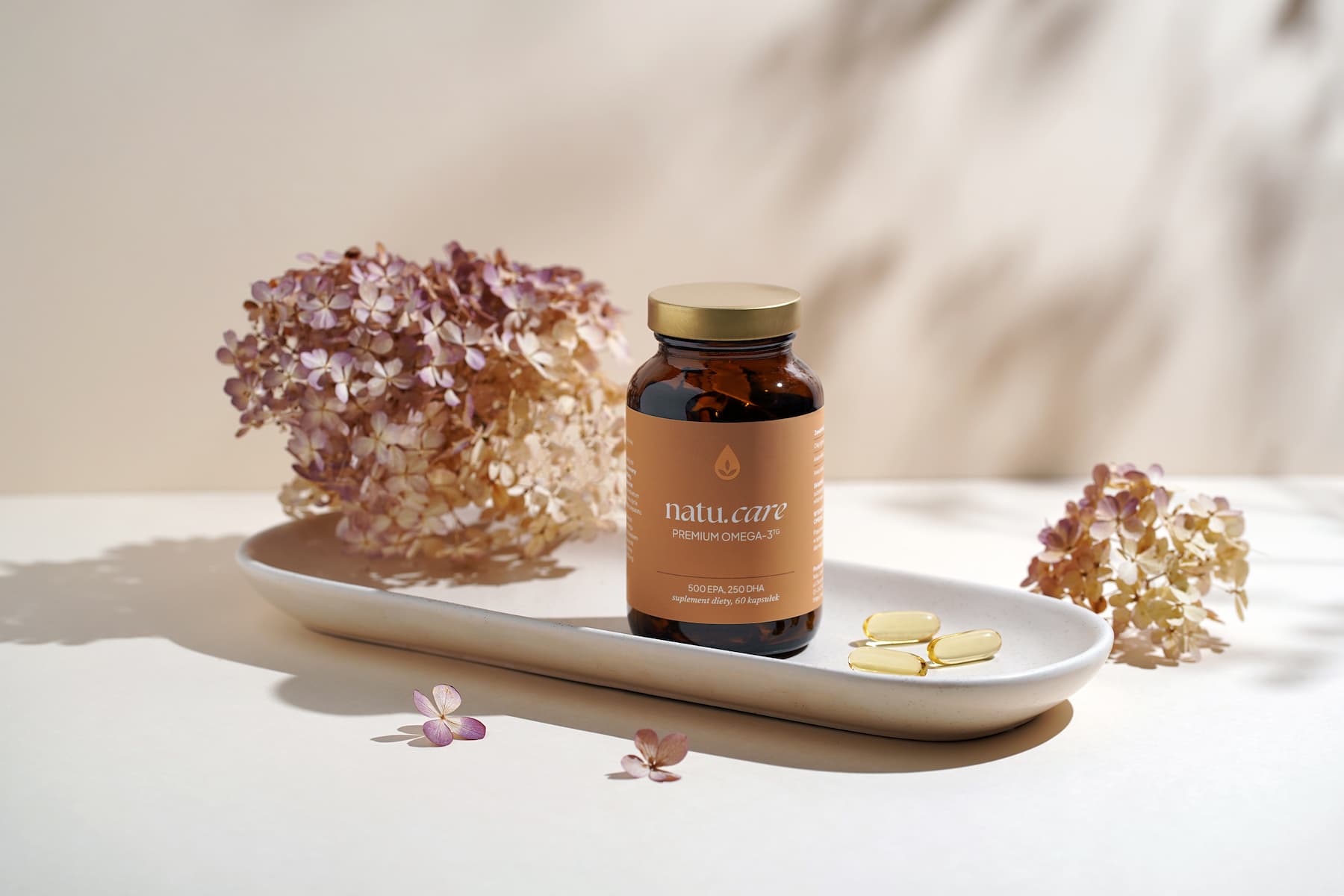
The omega-3 acids from Natu.Care are distinguished by their triglyceride form, which is characterised by high bioavailability.
